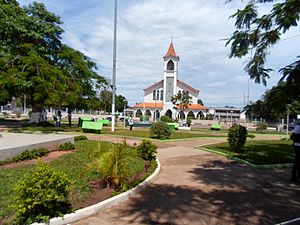Lunda Sul Province
- Lunda Sul Province is not to be confused with Luanda Sul, a satellite city of Luanda, the capital of Angola.
Lunda Sul | |
|---|---|
 Lunda Sul, province of Angola | |
| Country | Angola |
| Capital | Saurimo |
| Government | |
| • Governor | Daniel Félix Neto |
| • Vice-Governor for the Political, Economic and Social Sector | Ofélia Madalena Jeremias Uqueve Xiri |
| • Vice-Governor for Technical Services and Infrastructures | Evanerson Leandro Varo Kaputu |
| Area | |
• Total | 77,637 km2 (29,976 sq mi) |
| Population (2014 census)[1] | |
• Total | 537,587 |
| • Density | 6.9/km2 (18/sq mi) |
| ISO 3166 code | AO-LSU |
| HDI (2018) | 0.568[2] medium · 5th |
| Website | www |
Lunda Sul ("South Lunda") is a province of Angola. It has an area of 77,637 km2 and a 2014 census population of 537,587.[1] Saurimo is the provincial capital.
Geography and climate
[edit]The Lunda Sul province is located in the extreme east of Angola, the capital of Saurimo located 946 kilometres (588 mi) by road east of the capital Luanda.[3] It is bordered to the north by Lunda Norte Province, to the east by the Democratic Republic of the Congo, to the south by Moxico Province and southwest by Bié Province, and to the west by Malanje Province. The main road from Luanda to Lubumbashi traverses the province from west to east.[3]
The province is dominated by dry savannah land; only in the Kasai River valley are there remnants of tropical rainforest. The Kasai forms the eastern and southern frontier of Lunda Sul and is the main river of the province. The Kwango River is also a major river of the province.[4] The climate of the province is predominantly tropical.
Municipalities
[edit]The province of Lunda Sul contains four municipalities (Portuguese: municípios):[5]
Communes
[edit]The province of Lunda Sul contains the following communes (Portuguese: comunas); sorted by their respective municipalities:
- Cacolo Municipality: – Alto-Chicapa (Alto-Chikapa), Cacolo, Cucumbi (Kukumbi), Xassengue
- Dala Municipality: – Cazage (Cazeje), Dala, Luma Cassai
- Muconda Municipality: – Cassai Sul (Kassai Sul), Chiluage, Muconda, Muriege (Murieje)
- 'Saurimo Municipality: – Mona-Quimbundo (Mona-Kimbundo), Saurimo, Sombo
Economy and social issues
[edit]Economically the province is dominated by peanut cultivation, which is operated primarily in the Saurimo area. In the south of the province maize production is major contributing factor. Other agricultural products include rice, cassava and cereals. This region is rich with diamonds,[6] manganese and iron which are exploited; Catoca mine in Lunda Sul Province is the fourth largest diamond mine in the world. Due to warfare in the region, at times mining has been disrupted by attacks form the UNITA, especially in 1999-2000.[7] In spring 1999, UNITA destroyed the bridge on the Kasai River at Biula, affecting transport communications in the region between Lunda Sul and Moxico.[8]
Like in many other areas of Angola, landmines are a serious problem, and it is described as being "severely mined". As of 1995, some 30 major or strategic bridges and 58 secondary bridges had been destroyed in the province according to Oxfam reports.[9] "Forced return and restrictions to freedom of movement" by people has been noted in the province, and the Huambo and Cuando Cubango provinces.[10]
Demographics
[edit]
The origin of the province's population belongs to the ethnic groups of the Lunda and Chokwe people, which are closely connected historically. They are mainly involved in agriculture. There are also many immigrants from other parts of the country, working for the Endiama or as independent diamond miners. The struggle between the Lunda and Chokwe to obtain wealth from the diamond industry has increased tension in the province.[11]
List of governors of Lunda Sul
[edit]| Name | Years in office |
|---|---|
| José Manuel Salukombo | 1978–1978 |
| Celestino Figueiredo Tchinhama Faísca | 1978–1981 |
| Lt. Col. José César Augusto Kiluanji | 1981–1983 |
| Luís Dokui Paulo de Castro | 1983–1986 |
| Rafael Sapilinha Sambalanga | 1986–1988 |
| Graciano Mande | 1988–1992 |
| José Manuel Salucombo | 1992–1993 |
| Moisés Nele | 1993–1997 |
| Domingos Oliveira | 1998–1999 |
| Francisco Sozinho Chiuissa | 1999–2002 |
| Miji Muachissengue | 2002–2008 |
| Cândida Maria Guilherme Narciso | 2008–2017 |
| Ernesto Fernando Kiteculo | 2017–2018 |
| Daniel Félix Neto | 2018– |
Up to 1991, the official name was Provincial Commissioner
References
[edit]- ^ a b "Resultados Definitivos Recenseamento Geral da População e Habitação - 2014" (PDF). Instituto Nacional de Estatística, República de Angola. Retrieved 3 May 2020.
- ^ "Sub-national HDI - Area Database - Global Data Lab". hdi.globaldatalab.org. Retrieved 2018-09-13.
- ^ a b "Lunda Sul Province" (Map). Google Maps. Retrieved 22 September 2014.
- ^ Compendium of elections in Southern Africa, 1989-2009: 20 years of multiparty democracy. Electoral Institute of Southern Africa. 2009. p. 24. ISBN 978-1-920095-76-5.
- ^ "Angola". Geohive. Archived from the original on 30 September 2016. Retrieved 22 September 2014.
- ^ Kolapo, Femi James (2009). Immigrant Academics and Cultural Challenges in a Global Environment. Cambria Press. p. 258. ISBN 978-1-60497-568-0.
- ^ Weigert, Stephen L. (25 October 2011). Angola: A Modern Military History, 1961-2002. Palgrave Macmillan. p. 153. ISBN 978-0-230-33783-1.
- ^ Kukkuk, Leon (1 January 2004). Letters to Gabriella. FLF Press. p. 358. ISBN 978-1-891855-67-2.
- ^ Roberts, Shawn; Williams, Jody (1 January 1995). After the Guns Fall Silent: The Enduring Legacy of Landmines. Oxfam. p. 100. ISBN 978-0-85598-337-6.
- ^ Human Rights Watch World Report, 2003. Human Rights Watch. January 2003. p. 15. ISBN 978-1-56432-285-2.
- ^ Hodges, Tony (2001). Angola: From Afro-Stalinism to Petro-diamond Capitalism. Indiana University Press. p. 163. ISBN 0-85255-851-1.
- ^ "Histórico dos Governadores" (in Portuguese). lundasul.gov.ao. Retrieved 6 Mar 2019.
